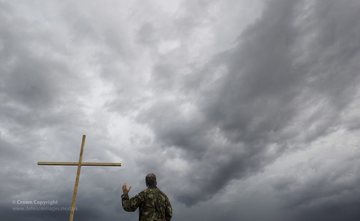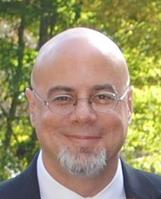|
By: Fr. Paul Dordal  The Sky Pilot I am convicted. I have been a poser. I am repenting. I am a pacifist. As I was struggling with a moral injury suffered, in large part, because of my service in Iraq as an Army Chaplain, a friend suggested in early 2015 that I read Leo Tolstoy’s The Kingdom of God is Within You. The first few pages affected me deeply. Tolstoy said, “Among the many points in which [the Institutional Church’s] doctrine falls short of the doctrine of Christ I pointed out as the principal one the absence of any commandment of non-resistance to evil by force. The perversion of Christ’s teaching by the teaching of the Church is more clearly apparent in this than in any other point of difference.” 1 As I read Tolstoy I could hear again the words of Eric Burdon song’s Sky Pilot. I realized then that in order for me to live more authentically as a Syro-Chaldean Catholic priest, a Veterans Affairs Hospital Chaplain, but more poignantly as a former US Army Chaplain and veteran of the war in Iraq, I was going to have to change: He blesses the boys as they stand in line/ A Sky Pilot is a euphemism for a military chaplain—one who is charged to bless soldier’s activities in the military. My ongoing struggle has been to fully integrate my inner belief in Christ’s Gospel of Peace (nonviolence) and my participation in war as a Chaplain, even as a declared non-combatant.3 In my past I have vacillated between ambivalently holding to a doctrine of pacifism/nonviolent resistance and at other times professing to being a reluctant just-war proponent.4 A bit more of my history will shed light on my dilemma. I volunteered to join the Army in 1984 in Brooklyn, NY, after flunking out of college. I was hardly a patriot at the time of my enlistment, and I often openly expressed this while in uniform. I even claimed I was an anarchist in my exit interview in 1987. In the late summer of 1990 right before the first Gulf War formally started, I began wearing a large button on the streets of New York City that asked, “Where’s April Glaspie?”5 This ambiguous question proclaimed my opposition to the first Gulf War to all I came into contact with and inquired, Who is April Glaspie? After the attack on the World Trade Center on September 11th, I wrote an article entitled, “A Church Divided Unites under the Wrong Flag.” The article was published in 2001 on the Jesus Radicals website.6 Though not specifically a pacifist piece, it was a prophetic anti-war diatribe directed primarily at the Church. In 2003, I marched (in my clerics) in NYC with protestors against the impending second war against Iraq, and I, again, became active in the peace movement. In 2006, I preached a prophetic sermon from the first chapter of the Hebrew Testament Book of Habakkuk in a Pittsburgh area church, where I served as the pastor. In that sermon I compared the U.S. Church and Nation with the exiled Israelite nation, which had become so sinfully unjust and murderous that God was forced to bring judgment upon them. My on-again off-again peace activism took a turn for the worse after I succumbed to the pressure to conform to the American Empire and its Churchianity. In February 2008, at age 43, I was commissioned a chaplain in the US Army, after having been asked by an Air Force General to consider becoming a chaplain because so many young men and women were going to war without spiritual support. The struggle in making that decision is too complex to describe in this article. Suffice it to say, my decision was a principled one, but it was not completely selfless; it was both noble and ignoble. There was a shadow side to my wanting to serve again, and I still suffer from guilt and shame as result of my choice. I arrived in Baghdad, Iraq in early October of 2009, and within a week of my experience in war I was counseling a sobbing soldier who was distraught over the possibility of having killed someone. To say that I struggled with this first of many ethical challenges in Iraq, would be a gross understatement. The best I could do at the time was to say in various ways, “Saddam Hussein was a bad man—a very bad man!” In 2012, suffering from mild post-traumatic stress disorder I sought to minister healing to myself by expressing my belief that the war in Iraq was justifiable. I did this through a paper I wrote while studying for a third theology degree at Duquesne University. The paper was titled “Just War On Terror? Applying Just-War Tradition to the Global War on Terror.” I found some support for this idea. Nevertheless, the paper was a pose, a rationalization to help me soften my own guilt. I was a Sky Pilot who, in effect and in reality supported the war, and not just the soldiers who fought it. So, in this article, I am admitting that I was a Sky Pilot, but I am also publicly declaring my ethical and practical stance as a pacifist (and emerging Christian anarchist). Though adopting such a public stance may mean I may not be welcomed to participate fully in the in-groups of my current or past family, friends, colleagues, and church group, I believe it is imperative for me to admit finally who I am and live life as the pacifist I have always been. While engaging in this very freeing, but scary process I want to acknowledge the courageous testimony of Pastor Brian Zahnd, who said of his tacit and sometimes explicit support of war, “It was my worst sin.”7 Catholic Social Teaching And Pacifism As a Syro-Chaldean priest I have also been helped in coming to my moral stance by engaging the pacifist movement within the Roman Catholic Church. For most of its history the Roman Church supported just-war theory as its official stance. The scathing critique of Tolstoy and some modern Catholic pacifists is fully justified because Catholic teaching on this matter throughout the ages has clearly not been rooted in the non-violent teachings of Jesus. Fortunately, the Roman Catholic Church has moved considerably towards a more pacifistic in recent years. Noted Catholic moral theologian Charles Curran said, “For the first time pacifism and nonviolence are recognized as acceptable approaches within the Roman Catholic Church.”8 In 1983 when the U.S. Catholic bishops issued The Challenge of Peace: God’s Promise and Our Response, they acknowledged that there was a historical precedent for a nonviolent approach to living the Christian life. They cited the writings of St. Justin, St Cyprian of Carthage, and St. Francis of Assisi as exemplary of a pacifistic understanding of the Gospel. The bishops said, “Moved by the example of Jesus’ life and by his teaching, some Christians have from the earliest days of the Church committed themselves to a nonviolent lifestyle. Some understood the gospel of Jesus to prohibit all killing. Some affirmed the use of prayer and other spiritual methods as means of responding to enmity and hostility.”9 Additionally, the American bishops said that the pacifist position was not one of fatalism or resignation from the world. They acknowledged that, “The vision of Christian nonviolence is not passive about injustice and the defense of the rights of others; it rather affirms and exemplifies what it means to resist injustice through non-violent methods.” 10 There are many more historical examples of Catholic’s calling for an ethic and lifestyle of pacifism (and anarchism). From such notable names as Dorothy Day, Daniel Berrigan, Thomas Merton, Henri Nouwen, and more recently Marie Dennis and John Dear, the call to a lifestyle of nonviolence has been very pronounced within Catholicism over the last century. But my hero of Catholic pacifism is the conscientious objector Ben Salmon, who during World War I wrote to President Woodrow Wilson which said, “Regardless of nationality, all men are my brothers. God is ‘our Father who art in heaven.’ The commandment ‘Thou shalt not kill’ is unconditional and inexorable. … Both by precept and example, the lowly Nazarene taught us the doctrine of non-resistance, and so convinced was He of the soundness of that doctrine that he sealed His belief with death on the cross.”11 Salmon would not serve even as a noncombatant because he believed the “noncombatant was aiding in the war effort.”12 For taking this stance Ben Salmon spent several years in prison. An icon of Salmon hangs in my office at the VA hospital where I minister. Next Steps I have had to tread carefully in my new public stance. In my current ministerial context as a VA chaplain I do not want to alienate the veterans I care for, many of whom are suffering greatly from their own participation in war and violence. But I won’t be a poser anymore. As I move into becoming a peacemaker and a Christian anarchist, I have dramatically changed how I engage in ministry. Since last year I have been very active with the Thomas Merton Center’s Anti-War Committee in Pittsburgh (as well as with other peace and justice groups). I have been working with progressives and others in bringing awareness through various actions to the continual warmongering and criminal activities of the U.S. government. My activism has raised some eyebrows among my family, friends, colleagues, and my Church, as has my emerging articulation that Christian anarchism is the essence of the Gospel. Nevertheless, it is time for me to live congruently and not in fear. I am blessed to hear Jesus speaking grace to me throughout this process. I am grateful for a supportive wife, and that I have found new friends and colleagues who are like minded. Most importantly, I have gained my freedom from living out of a false-self, and I look forward to the joy of working to implement Jesus’ call to live out the Gospel of Peace. It is my prayer that other pastors, priests, and ministers will hear and heed this call as well. Notes:
 Paul Dordal is an ordained priest in the Syro-Chaldean Church of North America. He ministers full-time at the VA Hospital in Pittsburgh as a clinical chaplain. He is an activist with the Thomas Merton Center’s Anti-War Committee, as well as a member of Veterans for Peace, Iraq Veterans Against the War, and the American Federation of Government Employees union. He is also an emerging anarchist. He lives with his wife and three children in Pittsburgh.
Comments
|
Disclaimer
The viewpoints expressed in each reader-submitted article are the authors own, and not an “official Jesus Radicals” position. For more on our editorial policies, visit our submissions page. If you want to contact an author or you have questions, suggestions, or concerns, please contact us. CategoriesAll Accountability Advent Anarchism Animal Liberation Anthropocentrism Appropriation Biblical Exegesis Book Reviews Bread Capitalism Catholic Worker Christmas Civilization Community Complicity Confessing Cultural Hegemony Decolonization Direct Action Easter Economics Feminism Heteropatriarchy Immigration Imperialism Intersectionality Jesus Justice Lent Liberation Theology Love Mutual Liberation Nation-state Nonviolence Occupy Othering Pacifisim Peace Pedagogies Of Liberation Police Privilege Property Queer Racism Resistance Resurrection Sexuality Solidarity Speciesism Spiritual Practices Technology Temptation Veganism Violence War What We're Reading On . . . White Supremacy Zionism ContributorsNekeisha Alayna Alexis
Amaryah Armstrong Autumn Brown HH Brownsmith Jarrod Cochran Chelsea Collonge Keith Hebden Ric Hudgens Liza Minno Bloom Jocelyn Perry Eda Ruhiye Uca Joanna Shenk Nichola Torbett Mark VanSteenwyk Gregory Williams Archives
October 2017
|
Search by typing & pressing enter

 RSS Feed
RSS Feed